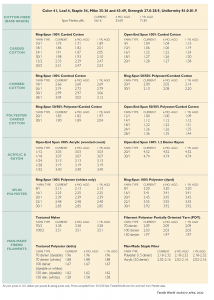 By Jim Phillips, Yarn Market Editor
By Jim Phillips, Yarn Market Editor
The market disruption caused by the global novel coronavirus pandemic is beginning to affect virtually all aspects of the U.S. economy, including the entire textile/apparel supply chain.
For spinners, this means a likely precipitous — hopefully temporary — drop in demand. With retail stores around the world reducing hours, or closing altogether, sales of apparel, home fashions, home furnishings and other products are expected to decrease sharply over the near term.
“Right now, it’s just wait and see,” said one industry expert. “With retailers like Abercrombie, Levi’s and Nordstrom closing at least through the end of March, we expect to see a general slowdown in orders across the entire supply chain. How deeply it will affect individual companies — and the industry as a whole — will depend on how long the epidemic lasts.”
“What we are really concerned about, from a business perspective, is how long this is going to last,” said one executive. “If it lasts long enough to affect back-to-school and holiday orders, it could turn into a bad year for the industry as whole.”
Already, with retailers, restaurants and others closing their doors, economists are projecting a global recession. “It’s hard to say how long it will take the economy to recover,” noted one economist.
“So much depends on how much containment we are able to achieve through such measures as social distancing. Worst-case projections show that up to 20 percent of Americans could be unemployed at some point during this crisis.”
Most spinners are still operating a full schedule, but are taking precautions to protect employees.
“We are sheltering in place,” said one spinner. “Right now, none of our plants are in the virus hotspots. But we have restricted visitation to all of our facilities to try to keep our folks from getting the coronavirus.”
He continued: “Obviously, our first concern is our people. But we are closely monitoring retail sales to see how our business might be affected. In times like these, some products will be difficult to move. But opportunities open for others.”
An industry analyst predicts high demand for medical textiles. “The issue is whether a huge demand increase can be satisfied before the need passes. Masks, gowns and such should move very well in the next few months.”
Sustainability Continues To Build Momentum
While the coronavirus epidemic dominates the news, other events of note are occurring. The Secondary Materials and Recycled Textiles (SMART) Association celebrated Global Recycling Day on March 18, 2020. This annual awareness day is organized by the Global Recycling Foundation and is designed to promote the role recycling plays in preserving the earth’s primary resources. The event’s 2020 theme is “recycling heroes” — a salute to unsung recycling heroes across the globe, including people, groups, organizations, and businesses who champion recycling practices and habits.
For SMART, increasing awareness of textile reuses and recycling is of utmost importance on Global Recycling Day. Textile waste has a dramatic global impact; the average U.S. adult discards 81 pounds of clothing each year. Of this, only 15 percent actually gets donated or recycled, with a staggering 85 percent of textile waste directed to landfills.
“What many don’t realize is that through the work of our members, nearly 1 billion pounds of textiles are diverted from landfills annually, which saves our environment from tons of harsh chemicals, waste products, wastewater and greenhouse gas emissions,” said Jackie King, SMART’s executive director.
Numerous spinners have well-entrenched sustainability programs in place, such as Unifi’s REPREVE® yarns and American & Efird’s Ten Threads of Sustainability. A&E’s parent, Elevate Textiles, also is committed across all of its business units to achieve sustainability milestones by 2025. Commitments include using responsibly sourced fibers, as well as reducing water consumption and greenhouse gas emissions.
March/April 2020





